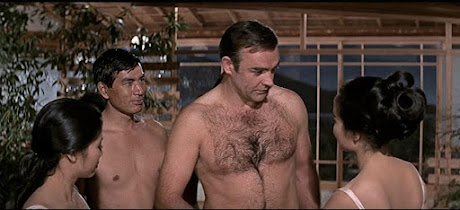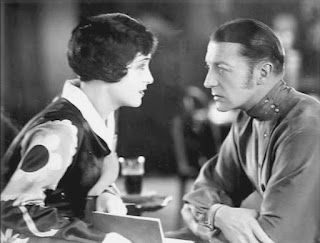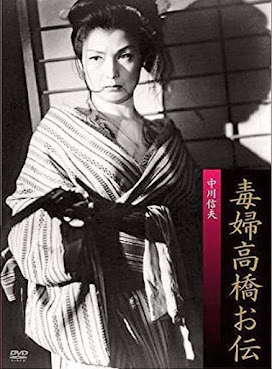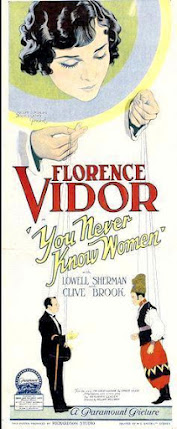You Tube remains heaven’s gift to the serious movie watcher. I never stop finding things there that I didn't know existed or thought
I’d never get to see. Quite often they look like they were filmed in a
blizzard and developed in weak tea but every so often they are stunning
sharp and well graded. That’s the lottery aspect of the game.
It's just as well it only surfaced comparatively recently. I
find the time I spend between dialing it up and closing it down
spreading to fill whatever leisure I have. I just
chalked up William Wellman's first Paramount movie and an example of
the fifties Japanese exploitation cinema both of which came as
surprises, despite all the time I've spent mining all the other sources
I've encountered down the years.
Dokufu Takahashi Oden / Wicked Woman,
directed by Nobuo Nakagawa in 1958, comes out of the void. It has the
interest of being an isolated example of the Dokufu or femme fatale
movies from what was the Golden period of Japanese cinema. A couple of
these dealt with real life Oden Takahashi, the last woman to be beheaded
in Japan. Films like this were more familiar in the ‘States, where
Japanese producers had their own chains of cinemas in the fifties - Toho
La Brea anyone? The copy’s English language sub-titles probably date
from that period.
The only recognisable name in the credits is busy Tetsurô Tanba (Five Man Army, Suna no utsuwa / Castle of Sand)
who does an authoritative turn as the lead’s pimp-gangster
employer-lover. As with other infamous women of fifties movie history
(Martine Carol doing Lucrezia Borgia, Rita Hayworth as Salomé) then
thirty year old Katsuko Wakasugi as Oden is presented as a victim of
evil men, a spineless drunk husband, an ailing lover, a seduced
policeman and Tamba, who has a line in kidnapping women off the street
to stock his below ground brothel.
We
kick off with Wakasugi outwitting a Tokyo jeweler, whose diamond she
steals by gumming it to the tip of her parasol, where a diligent body
search doesn’t find it. However a sharp eyed constable spots the gem and
soon she’s dragging him behind the paper screen - less physical than
Betty Amann in Asphalt. Her drunken rickshaw-man husband claims
he needs money to care for the daughter she abandoned but the mite
succumbs, believing she’s going to join her beloved dead mum in heaven.
The action shifts with whore-monger Tamba to China, where Wakasugi becomes queen of his
gambling
palace, joining the roulette and strip poker game and taking a brief
but uncharacteristically sensuous spa bath (close up of her tattooed
back going into the water and long shot where she appears naked cf. the Everybody Pays episode of Tokyo Vice.
The cop is on hand to rescue his superior’s sister, who has been
installed in the cellar and our heroine ends hands roped, on the train
to pay for her sins.
 |
You Only Live Twice - Tamba and Sean Connery.
|
This
mash up of soap opera and sub-noir thirties gangsters derives some
interest from the Meiji period plot and settings, all tailored to a
formula we are not familiar with. Director Nakagawa handles the variety
of subject matter with mechanical assurance. His rickshaw sequence drew
praise from those who presumably didn’t think it was a poor man’s
version of the set piece in Inagaki’s 1943 Muhomatsu no issho. The film is a must for the curious and has interest for the casual viewer. The copy is passable.
A more inviting discovery was William A. Wellman’s 1926 You Never Know Women.
Though well before his famous work, this one is already a piece of
sophisticated filmmaking, even with its formula scripting.
Walking
at night, elegant Florence Vidor is just missed by a falling girder
when a workman pulls her out of its path. Passing playboy in evening
clothes Lowell Sherman takes the credit and later shows up at the
theater, where she is appearing with Clive Brook’s Russian (!) circus,
bribing the doorman to let him in and offering a replacement for the
umbrella that was crushed in the accident - like Mozjoukine in Manulesco.
She
is one of the ensemble appearing in doll make-up and masks, along with
comic El Brendel, accompanied by a goose wearing glasses, strong man Joe
Bonamo coming on twirling a dwarf like a spun parasol and devoted star
Brook, doing a Houdini act where they chain him and lower him into a
water filled tank in a trunk - which doesn’t trail bubbles.
Lowell
moves on Florence, complete with romantic encounter on the studio
moonlit terrace and his top hat being dropped over Clive’s Pierrot mask.
To simplify the situation, Clive fakes drowning in a failure of his new
act, where they dump his trunk into the harbor. No one seems too
worried about the effect on the theater company’s future. It’s only a
movie, Ingrid!
Rejected
bounder Lowell stays in the theater after everyone has gone and moves
on Florence, pursuing her with a convenient flashlight. Film’s best
moment is when she pauses in the illusion cabinet and believed-dead
Clive appears in her place, halting Lowell’s advances.
 |
You Never Know Women - Vidor and Brook.
|
Film
making is particularly stylish in the staging of the show - curtain
propelled by the performers wearing it, legs visible under its edge,
the line of made-up players removing their mask-hats. We get Bonomo
seeing, through the opened legs of his on-stage partner, bit playing
Eugene Palette moving on his tootsie at the party. Growing intimacy is
shown by dissolving (in camera) to a closer medium shot view of the
leads or Brook’s attention closing in on Sherman by blacking out the
other half of the frame. (I though that was stylish when I saw it first
in Thorold Dickinson’s 1949 Queen of Spades) The cast emerge with
credit, offering Brendel probably his best role, plausibly Russian and
switching to knowing and serious in his last scenes.
You Never Know Women
is not a great film but it is remarkably assured and stylish and a
marker in its director’s career. Wellman buddy and later director,
Charles Barton worked in Hans Dreier’s art department here and Brendel
appears again in Wings.
Though the passable The Boob
does beat out the film as the earliest of the Wellman features to
survive, this one's You Tube copy is tinted and taken from a sharp
original. That’s worth a look on its own account.
Incidentally, as predicted, the copy of The New Adventures of Get Rich Quick Wallingford has been taken down. You Tube is treacherous, like the ocean. Never turn your back on it.
Barrie Pattison 2023



No comments:
Post a Comment